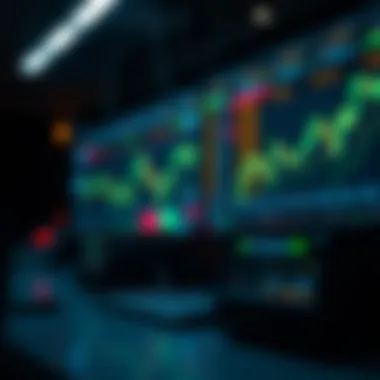Choosing the Best Crypto Exchange for Futures Trading


Intro
Understanding Cryptocurrency Fundamentals
What is Cryptocurrency?
At its essence, cryptocurrency is a digital or virtual form of currency that employs cryptography for security. Unlike traditional currencies, which are regulated by governments, cryptocurrencies operate on decentralized networks based on blockchain technology. Bitcoin, Ethereum, and Ripple are prime examples, each with unique applications and protocols.
A key point to highlight is the volatility inherent in cryptocurrencies. Prices can swing wildly, sometimes within a single day, presenting both opportunities and risks. This volatility is a double-edged sword; it requires traders to stay vigilant but also opens doors to potentially substantial profits.
How Blockchain Technology Works
Blockchains are the backbone of cryptocurrencies, functioning as a distributed ledger that records all transactions across a network of computers. Each block contains a set of transactions, all securely linked to the block before it, creating an immutable chain. This decentralized nature ensures transparency, as each participant in the network has access to the entire history of transactions.
To simplify things:
- Decentralization: No single entity has control over the entire network.
- Transparency: Anyone can view transaction history, fostering trust among users.
- Security: Cryptographic techniques secure data, making it exceedingly difficult to alter records without consensus.
Market Insights and Trends
Current Market Trends and Analysis
The crypto market has shown resilience and innovation, evolving rapidly over the past few years. Factors shaping market dynamics include regulatory news, technological advancements, and macroeconomic conditions.
- Increased Institutional Interest: Major companies like Tesla and MicroStrategy investing in Bitcoin have spurred a wave of institutional interest.
- Evolving Regulations: Countries are grappling with how to regulate cryptocurrencies, affecting market perceptions and investor confidence.
- Emergence of DeFi: Decentralized Finance or DeFi platforms are challenging traditional banking models, enabling people to lend, borrow, and earn interest on their assets without intermediaries.
Future Predictions and Investment Strategies
Looking ahead, experts suggest potential for significant growth in the crypto market, driven by advancements in technology and increased adoption. However, it's crucial to approach investment in crypto futures with caution due to the inherent risks. Here are some strategic considerations:
- Diversification: Don't put all your eggs in one basket. Consider spreading investments across different cryptocurrencies and futures.
- Staying Informed: Keep up-to-date with market news, trends, and developments within the crypto ecosystem.
- Risk Management: Understand your risk tolerance and set stop-loss orders to protect your investments.
"In the world of crypto, staying informed is as essential as one’s ability to take calculated risks."
By understanding these fundamentals and keeping an eye on market trends, you can better position yourself as a savvy investor in the realm of crypto futures. Armed with this groundwork, you’ll be ready as we explore the specifics of finding the right crypto exchange for futures trading.
Understanding Futures Trading in Crypto
In the fast-paced world of cryptocurrency, futures trading stands as a significant pillar. To grasp the importance of this topic, one must delve into the implications of futures contracts as they relate to market risks and investment strategies. This section is fundamental because it lays the groundwork for understanding how traders can leverage futures trading to engage with the market effectively.
Crypto futures serve as a contract between two parties to buy or sell a specific amount of a cryptocurrency at a predetermined price on a future date. Investors use this mechanism to hedge against price fluctuations, speculate on market directions, or amplify their potential returns using leverage. Therefore, this understanding is pivotal for investors, enthusiasts, and anyone keen on navigating the turbulent waters of cryptocurrency trading.
What Are Crypto Futures?
Crypto futures are contracts that obligate the buyer to purchase, or the seller to sell, a cryptocurrency at a predetermined price at a specified time in the future. Unlike traditional ownership, futures do not require the actual purchase of an asset. This aspect enables traders to speculate on price movements without physically holding the asset.
For instance, if a trader believes that Bitcoin will rise, they might enter into a futures contract to buy Bitcoin at today's price for delivery in six months. Conversely, if they think the price will fall, they can short-sell Bitcoin futures. This dual approach allows traders to profit from both rising and falling markets, offering versatility in their trading strategies.


How Futures Trading Works
Futures trading operates through various exchanges, where buyers and sellers come together to trade contracts. Each contract has a specific expiration date and a specific quantity of the cryptocurrency involved. Once the contract expires, the net difference between purchase price and the current market price determines profit or loss.
Central to futures trading is the concept of margin, which is a fraction of the total contract value the trader must deposit to open a position. This facility allows traders to control large contracts with relatively small capital, presenting both opportunities and risks.
For example, if a trader takes a long position, hoping the price will increase, they might put down 10% of the value of the contract as margin. If the price goes up, the trader earns profits, but if it goes down, they face potential losses much greater than their initial deposit, underscoring the risky nature of leverage in futures trading.
Key Terms in Futures Trading
To navigate futures trading, it's crucial to familiarize oneself with key terms:
- Margin: The collateral needed to open a leveraged position.
- Leverage: The ability to control larger positions with less capital.
- Settlement: The process of resolving the profit or loss at the end of the contract period.
- Expiration Date: The date when the futures contract is due.
- Long Position: Buying a futures contract expecting the price will increase.
- Short Position: Selling a futures contract expecting the price will decrease.
Understanding these terms helps traders make informed decisions, manage their funds better, and gauge their positions within the market.
"Before diving into futures trading, it is essential to educate oneself on the nuances of the market. Doing so may well be the difference between profit and loss."
Factors to Consider in a Crypto Futures Exchange
Selecting the right crypto exchange for futures trading isn't a walk in the park; it calls for a keen eye on several key factors. Not every exchange is built the same, so it's crucial to weigh what's on offer. Having the right exchange can mean the difference between a profitable trading experience and one riddled with complications. Let's explore some pivotal aspects that can influence your decision.
Security Features
When navigating a volatile environment like crypto, security should be top of mind. Look for exchanges that prioritize security measures, such as two-factor authentication, cold storage for assets, and regular security audits. These can be your lifeline against hacks or scams. However, having top-notch security often comes with a trade-off—higher fees or a slightly less user-friendly interface might be the price for that extra peace of mind. Still, it’s a necessary consideration; after all, better safe than sorry.
Liquidity and Market Depth
Liquidity, simply put, is how easily you can buy or sell an asset without affecting its price too much. A liquid market has plenty of activity, making it easier for you to enter and exit trades. On the flip side, if liquidity isn’t there, you could be stuck in trades longer than you'd like. Inspect the trading volume and order book depth of an exchange before jumping in. A solid option, often overlooked, could mean the difference between a smooth transaction and a rocky experience.
Trading Fees and Costs
Understanding the nuances of fees is vital when selecting a crypto exchange for futures trading. Different exchanges have varying fee structures; knowing these can significantly affect your profit margins.
Spot Fees
Spot fees often apply when you're buying or selling the underlying asset itself. These fees can vary widely from one exchange to another, based on their policies and the types of trades you’re making. A low spot fee is generally a good sign for an exchange, as it indicates competitive pricing. However, don't let low fees blind you from other important features like customer support or security measures.
Futures Fees
These fees apply specifically to futures contracts, which can differ from spots. Generally, futures fees are classified into two types: maker and taker fees. Maker fees are charged when you add liquidity to the order book, while taker fees are incurred when your order takes liquidity away. Opting for an exchange with competitive futures fees may offer significant cost savings, especially if you trade frequently. If the fees are too high, they can eat away at your potential gains.
Withdrawal Fees
These fees occur when you take your crypto out of an exchange. Depending on the platform, withdrawal fees can be flat rates or percentage-based. While they might seem like a minor inconvenience, high withdrawal fees can considerably affect your overall profits, particularly if you're a trader who frequently moves assets. Scrutinize these fees carefully, as they can vary significantly between exchanges. Keep an eye out for exchanges that offer fee waivers for high-volume withdrawals or provide incentives to use their native tokens to reduce costs.
User Experience and Interface
The user interface of an exchange can either make trading a breeze or turn it into a headache. An intuitive design improves trading efficiency. Vital features, like charting tools and market insights, should be easily accessible. If an interface feels clunky or confusing, it could lead to costly mistakes—nobody wants to click the wrong button at crunch time. Therefore, demo trading platforms or reading reviews to gauge user experience is worth your while.


Available Futures Contracts
Lastly, the range of futures contracts on offer is another aspect to keep on your radar. More options mean more opportunities to diversify your trading strategy. Some exchanges have a limited selection, leaving you vulnerable to market shifts. Evaluate the array of contracts available and make sure they align with your trading goals. An exchange that offers a variety of derivatives can provide greater flexibility and potentially higher rewards.
Top Crypto Exchanges for Futures Trading
When it comes to futures trading in the world of cryptocurrency, selecting the right exchange can make or break your trading experience. This section dives into the standout exchanges that cater specifically to futures trading, illuminating the features that set them apart from the competition.
Finding the best crypto exchange for futures trading is not just about trading options and fees; it's a matter of trust, security, and reliability. Each exchange brings its own set of features and complexities, which can have significant impacts on your trading outcomes. Understanding these exchanges allows traders not only to position themselves for potential profit but also to navigate the often turbulent waters of the crypto market with greater stability.
Exchange A: Key Features
One of the leading players in the futures market is Binance. Known for its extensive range of futures contracts, Binance offers various tools for advanced traders. The platform supports both isolated and cross margin modes, allowing traders to choose their risk levels more effectively. Security features, like two-factor authentication, and a track record of handling high trading volumes add to its appeal. What's more, users can benefit from relatively low trading fees, enhancing the potential for profit.
Exchange B: Key Features
Next up is BitMEX, a pioneer known for its unique offerings. BitMEX specializes in perpetual futures contracts and is often favored by more experienced traders. The interface is sleek, but it carries a learning curve for novices. High leverage options up to 100x may seduce traders looking for high-risk, high-reward scenarios. However, potential users should be acutely aware of the risks of such leverage. Security and user flexibility also make BitMEX a compelling choice for the savvy trader.
Exchange C: Key Features
Then there's Kraken, a reputable platform for many types of digital asset trading. Kraken’s futures trading interface is designed with usability in mind, striking a balance between beginners and advanced users. The platform prides itself on its robust security measures. Additionally, Kraken offers great liquidity in its futures market, allowing for more efficient trades. Its competitive fee structure and extensive educational resources further inch it higher on the preference scale of traders.
Exchange D: Key Features
Finally, we have FTX, although relatively newer, which has quickly gained recognition. FTX specializes in a variety of unique derivatives and leveraged tokens, appealing to innovative traders looking for diverse instruments. With its intuitive interface and well-developed risk management tools, FTX places a strong emphasis on user experience. Traders often rave about their responsive customer service and seamless withdrawal processes, crucial aspects when dealing with volatile markets.
Evaluating Exchange Performance
Comparative Analysis of Exchanges
User Reviews
User reviews stand out as a significant aspect in determining an exchange’s reputation. The collective feedback from actual traders can reveal valuable insights into an exchange's day-to-day operations and user experience. Not only do reviews highlight the strengths and weaknesses of an exchange, but they also reflect traders' sentiments, providing potential users with a realistic picture of what to expect. Moreover, the immediacy of these opinions allows for quick evaluations.
A critical characteristic of user reviews is their relatability, as they stem from traders with real experiences, often sharing detailed accounts of their interactions with the exchange. This personal touch adds authenticity to the feedback when compared to elaborate promotional material from the exchanges themselves. Additionally, the unique feature of user reviews is their accessibility; platforms like Reddit and specialized forums allow traders to voice their concerns or praises, creating a community-driven source for evaluations. This can lead to advantageous insights such as potential hidden fees or exceptional customer service scenarios, aiding prospective users in their decision-making process.
Nonetheless, it's crucial to approach user reviews with a discerning eye. There may sometimes be a tendency for emotional responses to color opinions, or even cases of misinformation stemming from isolated incidents. Thus, while they are useful, user reviews should be considered in conjunction with other performance metrics to paint a fuller picture.
Performance Metrics
Performance metrics offer a more quantitative approach to evaluating exchanges. These metrics encompass a range of statistical data, including trade execution speed, uptime records, and liquidity levels. An important aspect of using performance metrics is the ability to benchmark exchanges against one another objectively, ensuring that the evaluation is based on concrete figures. This data-driven approach is particularly beneficial for traders looking to refine their strategies based on a mix of efficiency and risk management.
A key characteristic of performance metrics lies in their ability to illuminate an exchange's operational capacity. For instance, a swift trade execution time can make a significant difference in a market characterized by volatility. Traders often favor exchanges that showcase lower latency, as it increases the chances of executing trades at desired price points.
The unique advantage of performance metrics is that they enable users to anticipate potential issues with an exchange before committing substantial funds. However, they also come with disadvantages. Raw data doesn’t capture user experience as comprehensively as qualitative reviews, meaning that, when used alone, they may omit critical context behind the numbers. Therefore, blending both user reviews and performance metrics leads to a more balanced analysis of any crypto exchange.
Regulatory Concerns


Navigating through the world of crypto futures trading is not merely about finding the right platform; it also requires an understanding of regulatory concerns that could impact trading activities. Cryptocurrency regulations vary significantly across jurisdictions, influencing how exchanges operate. Regulatory compliance adds an layer of legitimacy to an exchange, ensuring that it adheres to necessary legal frameworks to protect traders from potential fraud.
Some exchanges prioritize transparency, providing detailed information about their regulatory status and how they handle compliance aspects. Traders should remain vigilant, since a lack of proper regulation might elevate the risk of encountering unreliable exchanges. Keeping abreast of these issues not only safeguards investments but also contributes to a healthier trading environment for all participants.
Risks of Trading Crypto Futures
Understanding the risks of trading crypto futures is crucial for anyone looking to navigate the often-turbulent waters of this investment landscape. While futures trading presents opportunities for substantial gains, it also carries inherent risks that can catch even seasoned traders off guard. This section delves into the primary risks associated with crypto futures and emphasizes why potential traders must arm themselves with this knowledge before diving in.
Market Volatility
One cannot discuss crypto futures without addressing the elephant in the room: market volatility. The crypto market is notorious for its price fluctuations, sometimes shifting dramatically within hours or even minutes. This volatility can lead to significant profit potentials but also catastrophic losses.
For instance, consider a trader who speculates that Ethereum will rise. They might enter a long position, only to watch the price plummet shortly afterward due to unforeseen market dynamics or adverse news. With crypto futures, these swift responses in prices can amplify losses due to the nature of contracts. Traders often set stop-losses, which are intended to limit losses, but in highly volatile markets, slippage can occur, leading to situations where one loses more than what was anticipated.
"The crypto world moves fast, and if you blink, you might miss your opportunity—or worse, catch the wrong wave."
Leverage Risks
Another critical aspect to consider is leverage risks. Many exchanges offer the option to trade on margin, meaning traders can open positions much larger than their actual capital would allow. While this can boost profits — yes, you can make serious gains from small price shifts — it also means your losses can escalate just as quickly.
For instance, if a trader uses 10x leverage on a futures contract worth $1,000, they control a position worth $10,000. If the market moves against them even slightly, a small percentage loss can result in a total account wipeout. Many traders underestimate the speed at which leverage can turn the tides, leading to unfortunate financial outcomes.
Counterparty Risks
Finally, counterparty risks play a significant role in futures trading. This refers to the possibility that the exchange or platform you are trading with may face insolvency or other failures that affect your trades. If an exchange were suddenly to go under, a trader could potentially lose their entire investemnt.
A stark example can be seen with the collapse of several notable exchanges in the past years: users found themselves unable to access their funds, contracts became worthless, and trust was shattered. This risk highlights the importance of not only choosing a reputable exchange but also keeping abreast of any potential regulatory changes or operational issues within the platforms being used.
Closure
Culmination and Recommendations
Navigating the world of crypto futures trading can often feel like trying to find your way through a maze blindfolded. With the vast number of exchanges and intricacies involved, knowing how to wrap your head around the topic is crucial. This final section aims to bring it all together, emphasizing the importance of making well-informed decisions when it comes to selecting the optimal exchange for futures trading.
When you consider the selection process, several specific elements demand your attention. Understanding security features isn't just a matter of peace of mind; it plays a monumental role in safeguarding your investments. The legitimacy of exchanges often hinges on their liquidity and market depth, influencing the ease with which you can enter and exit positions without incurring steep losses. Keep an eye also on the costs associated with trading; hidden fees can chip away at your bottom line.
Moreover, user experience can make or break your trading efficiency. You want an interface that allows you to execute your trades smoothly, absent of convoluted pathways. The type of futures contracts offered matters too; some exchanges can cater to your specific trading strategies more accurately than others.
It's clear that due diligence bears significant weight in this field, and you mustn't just leap into a platform without thorough research.
Summarizing Key Takeaways
- Know What You Need: Before anything, identify what features are non-negotiables for you. Is it security? User experience? Or perhaps low trading fees?
- Conduct Comparisons: Look at various exchanges side by side. Examine their security features, fees, and liquidity before making any decisions.
- Read User Reviews: Tap into the wisdom of others; user experiences can guide you through potential pitfalls.
"A fool and his money are soon parted." Heed this old adage, and don’t rush your decisions.
- Stay Updated: The crypto landscape changes rapidly. Keep abreast of market trends and evolving regulatory norms to ensure you stay compliant and competitive.
Making Informed Decisions
Making informed decisions in crypto futures trading doesn't happen overnight. It requires a mix of research, understanding of market dynamics, and a continual assessment of your own risk appetite. Take a systematic approach to your research—understand the pros and cons of each exchange you consider.
Don’t put all your eggs in one basket; diversifying your trading across recognized platforms can shield you from potential exchange-specific downturns. If a promising exchange suddenly changes its policy or gets mixed up in regulations, having stakes spread across various platforms allows for more flexibility and less risk.
In your decision-making process, leverage multiple sources of information. Online forums, like those on Reddit, can provide firsthand experiences, while official documentation from exchanges can clarify confusing terms. Knowledge truly is power here; the more informed you are, the better choices you can make that align with your financial strategy.



